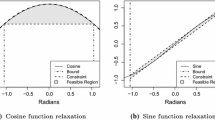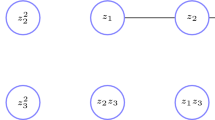Abstract
In this paper, we propose some new semidefinite relaxations for a class of nonconvex complex quadratic programming problems, which widely appear in the areas of signal processing and power system. By deriving new valid constraints to the matrix variables in the lifted space, we derive some enhanced semidefinite relaxations of the complex quadratic programming problems. Then, we compare the proposed semidefinite relaxations with existing ones, and show that the newly proposed semidefinite relaxations could be strictly tighter than the previous ones. Moreover, the proposed semidefinite relaxations can be applied to more general cases of complex quadratic programming problems, whereas the previous ones are only designed for special cases. Numerical results indicate that the proposed semidefinite relaxations not only provide tighter relaxation bounds, but also improve some existing approximation algorithms by finding better sub-optimal solutions.

Similar content being viewed by others
Notes
In the literature, the term “gap" means the difference between the optimal value of an optimization problem and its lower/upper bound. Here we borrow the term “gap" for convenience, but the meaning is different.
References
Bandeira, A.S., Boumal, N., Singer, A.: Tightness of the maximum likelihood semidefinite relaxation for angular synchronization. Math. Program. 163, 145–167 (2017)
Chen, C., Atamtürk, A., Oren, S.S.: A spatial branch-and-cut method for nonconvex QCQP with bounded complex variables. Math. Program. 165, 549–577 (2017)
Coffrin, C., Hijazi, H.L., Hentenryck, P.V.: Strengthening the SDP relaxation of AC power flows with convex envelopes, bound tightening, and valid inequalities. IEEE Trans. Power Syst. 32, 3549–3558 (2017)
Demir, Ö.T., Tuncer, T.E.: Optimum discrete single group multicast beamforming. In: Proceedings of the IEEE International Conference on Acoustics, Speech, and Signal Processing (ICASSP’14), pp. 7744–7748. IEEE Press, Florence (2014)
Demir, Ö.T., Tuncer, T.E.: Optimum discrete transmit beamformer design. Digital Signal Process. 36, 57–68 (2015)
Goemans, M., Williamson, D.: Improved approximation algorithms for maximumcut and satisfiability problems using semidefinite programming. J. ACM 42, 1115–1145 (1995)
Goemans, M.X., Williamson, D.P.: Approximation algorithms for Max-3-Cut and other problems via complex semidefinite programming. J. Comput. Syst. Sci. 68, 442–470 (2004)
Low, S.H.: Convex relaxation of optimal power flow-Part I: formulations and equivalence. IEEE Trans. Control. Netw. Syst. 1, 15–27 (2014)
Low, S.H.: Convex relaxation of optimal power flow-Part II: exactness. IEEE Trans. Control. Netw. Syst. 1, 177–189 (2014)
Lu, C., Deng, Z., Zhang, W.-Q., Fang, S.-C.: Argument division based branch-and-bound algorithm for unit-modulus constrained complex quadratic programming. J. Global Optim. 70, 171–187 (2018)
Lu, C., Liu, Y.-F., Zhang, W.-Q., Zhang, S.: Tightness of a new and enhanced semidefinite relaxation for MIMO detection. SIAM J. Optim. 29, 719–742 (2019)
Lu, C., Liu, Y.-F., Zhou, J.: An enhanced SDR based global algorithm for nonconvex complex quadratic programs with signal processing applications. IEEE Open J. Signal Process. 1, 120–134 (2020)
Luo, Z.-Q., Ma, W.-K., So, A.M.-C., Ye, Y., Zhang, S.: Semidefinite relaxation of quadratic optimization problems. IEEE Signal Process. Mag. 27, 20–34 (2010)
Ma, W.-K., Ching, P.-C., Ding, Z.: Semidefinite relaxation based multiuser detection for M-ary PSK multiuser systems. IEEE Trans. Signal Process. 52, 2862–2872 (2004)
Maio, A.D., Nicola, S.D., Huang, Y., Luo, Z.-Q., Zhang, S.: Design of phase codes for radar performance optimization with a similarity constraint. IEEE Trans. Signal Process. 57, 610–621 (2009)
Maio, A.D., Huang, Y., Piezzo, M., Zhang, S., Farina, A.: Design of optimized radar codes with a peak to average power ratio constraint. IEEE Trans. Signal Process. 59, 2683–2697 (2011)
Mosek ApS. mosek. http://www.mosek.com (2020)
So, A.M.-C., Zhang, J., Ye, Y.: On approximating complex quadratic optimization problems via semidefinite programming relaxations. Math. Program. 110, 93–110 (2007)
Soltanalian, M., Stoica, P.: Designing unimodular codes via quadratic optimization. IEEE Trans. Signal Process. 62, 1221–1234 (2014)
Waldspurger, I., d’Aspremont, A., Mallat, S.: Phase recovery, MaxCut and complex semidefinite programming. Math. Program. 149, 47–81 (2015)
Zhang, S., Huang, Y.: Complex quadratic optimization and semidefinite programming. SIAM J. Optim. 16, 871–890 (2006)
Zhao, P.-F., Li, Q.N., Chen, W.K., Liu, Y.-F.: An efficient quadratic programming relaxation based algorithm for large-scale MIMO detection. SIAM J. Optim. 31, 1519–1545 (2021)
Author information
Authors and Affiliations
Corresponding author
Additional information
Publisher's Note
Springer Nature remains neutral with regard to jurisdictional claims in published maps and institutional affiliations.
Lu’s research has been supported by National Natural Science Foundation of China Grant Nos. 12171151 and 11771243. Deng’s research has been supported by the National Natural Science Foundation of China Grant No. T2293774, by the Fundamental Research Funds for the Central Universities E2ET0808X2, and by the grant from MOE Social Science Laboratory of Digital Economic Forecast and Policy Simulation at UCAS. The work of Y.-F. Liu was supported in part by the National Natural Science Foundation of China Grant Nos. 11688101, 12021001 and 12022116.
Rights and permissions
Springer Nature or its licensor (e.g. a society or other partner) holds exclusive rights to this article under a publishing agreement with the author(s) or other rightsholder(s); author self-archiving of the accepted manuscript version of this article is solely governed by the terms of such publishing agreement and applicable law.
About this article
Cite this article
Xu, Y., Lu, C., Deng, Z. et al. New semidefinite relaxations for a class of complex quadratic programming problems. J Glob Optim 87, 255–275 (2023). https://doi.org/10.1007/s10898-023-01290-z
Received:
Accepted:
Published:
Issue Date:
DOI: https://doi.org/10.1007/s10898-023-01290-z




